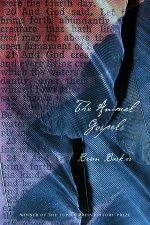About the Author
Brian Barker earned a BA from Virginia Commonwealth University, an MFA from George Mason University, and a PhD from the University of Houston. He is the author of two collections of poetry, and has been published in journals such as Poetry, Indiana Review, Sou’wester, Pleiades, and River Styx.
Barker’s first collection, The Animal Gospels (2006), won the Tupelo Press Editor’s Prize. The Black Ocean (2011), his second collection, won the Crab Orchard Open Competition in 2011. Barker is the recipient of various awards and honors, including two Pushcart nominations, an Academy of American Poets prize, and the 2009 Campbell Corner Poetry Prize.
Barker teaches at the University of Colorado, Denver, where he co-edits Copper Nickel, a journal of art and literature.
Advanced Praise:
“The Animal Gospels is a collection of lyric-narrative poems that explore faith, identity, loss, racism, the transience of being, and coming of age in the South at the end of the 20th century. [His] mystical intimacy is part of what makes Animal Gospels a marvelous first book. It presents the reader with meditations on what it means to be the product of gospels seen as obsolete—those of Americana, of old–time religion, and of the intersection between the human and natural worlds.” —Chad Parmenter, Pleiades
“In poem after poem, Barker reaches for insight with the highest lyrical and narrative ambitions, moving within and between time and imagination, at all times examining the strange entanglement of elements that make us who we are. Like the ‘fizz and flash / of your spent filament’ that briefly illuminates the ‘foggy-eyes stranger’ in the mirror of ‘Self-Portrait With Burnt Out Light Bulb’—like that ‘smoky globe’ which, when shaken, emits a ‘scarce, peculiar song of broken light’—it is the musical world that draws Barker to the poetic medium.” —Andrew McFadyen-Ketchum, Crab Orchard Review
“[T]he compelling thing isn’t that Barker uses his mammals and birds as vehicles of human failure. Rather, it’s that he so often manages to do this without getting sucked into the yawning thematic vortex of the metaphor itself.” —Matthew Ladd, West Branch
Format: Paperback
ISBN: 978-1-932195-25-5

